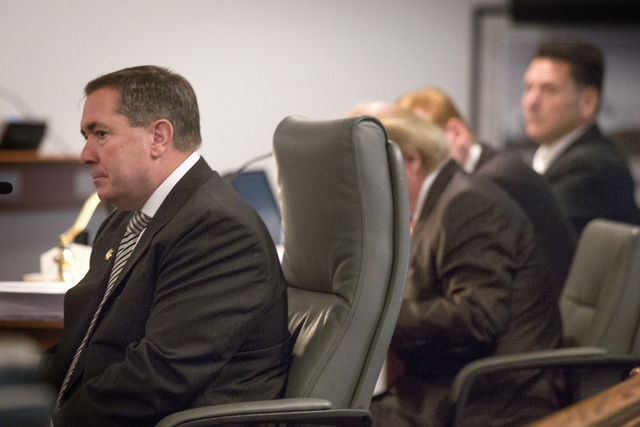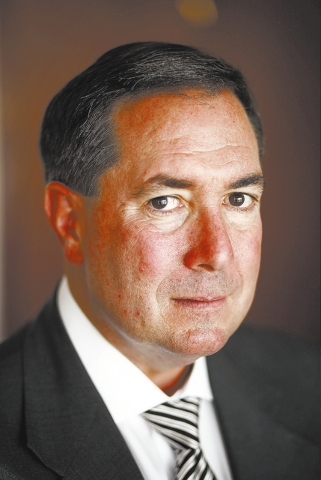Emails show DA’s office wasted over $300K on witness payments
Each time a new controversy arises about how the Clark County district attorney’s office pays witnesses for court appearances, the same question pops up.
What else doesn’t the public know?
In 2009, it turns out, there was a lot more to know.
Public records show that back then the office found a host of problems it kept quiet: An estimated $337,200 in wasted money, employees using fake subpoenas to justify paying witnesses for appearing in court and payments to officers who were on the clock and thus already compensated.
Staff for current District Attorney Steve Wolfson, who wasn’t in office in 2009, provided the Las Vegas Review-Journal with the records in accordance with the state public records law but questioned the gravity of what the records showed.
The self-examination followed media coverage about prosecutors paying witnesses to meet with them before trial. State law requires witnesses be paid a $25 fee for appearing in court and be compensated for their mileage. The district attorney’s office had been interpreting the law to extend to meetings.
The matter came to light after a prosecution witness told defense attorneys she had lied to get money to fuel her crack cocaine habit. She got $25 for showing up and another $25 for a taxi she said she didn’t take.
After the story, Terry Johnson, director of administration for the office for then-District Attorney David Roger emailed his boss saying that if reporters looked into how much officers were paid — which he noted “are no small sums incidentally” — it could give the story “legs.”
Roger, who left the district attorney’s office before his term was up to work for the police union, did not respond to a request for comment for this story.
‘IT’S JUST REALLY UNFORTUNATE’
Internal examination isn’t enough to satisfy the public’s questions, according to Tod Story, executive director of the American Civil Liberties Union of Nevada.
Nothing short of an outside agency coming in to scour the books will ensure both justice and taxpayer money are being safeguarded.
“It clearly needs to be done as everything that has been done at this point has been reactionary,” Story said. He called for the state attorney general’s office to take action about the DA’s office in 2014, but former Attorney General Catherine Cortez Masto, who is now running for the U.S. Senate, did nothing.
Among the unanswered questions, Story said: How much was spent on unnecessary payments? How long did it go on? And how does the public know the problems have been solved?
Story also questioned whether employees printing fake subpoenas when a witness didn’t have proof they met the requirement for a payment had been abused to rig cases.
Victor Joecks, executive vice president at the Nevada Policy Research Institute, echoed that sentiment.
“I think it’s just really unfortunate that they didn’t just release this investigation years ago,” Joecks said. “I think there’s been a lot of questions raised about the office and the operations. Are there other things going on that we haven’t found out about yet?”
He also questioned whether or not employees created subpoenas to steal from the government.
“That’s pretty amazing if they have a fake subpoena system to game taxpayers,” he said.
Magann Jordan, program administrator for the Victim Witness Assistance Center in the district attorney’s office, answered questions for the Review-Journal but pointed out neither she nor Wolfson worked there in 2009, at the time of the review.
In an effort to assist in finding answers, Jordan said, the office reached out to Johnson after he had spoken with a Review-Journal reporter.
Johnson told the DA’s office his investigation found no evidence fake subpoenas were being used to rig cases, Jordan said. And he found only one law enforcement employee — from the Nevada Division of Parole and Probation — who asked for payments he wasn’t entitled by submitting multiple subpoenas, she said.
Plus, Jordan said, Johnson’s investigation never generated a report.
Earlier, when he spoke to the Review-Journal, Johnson’s recollection of his review differed. Asked how big of a concern falsified subpoenas was, Johnson said he couldn’t quantify it six years later.
But he did say it was of enough concern to spur policy change.
Johnson said he recalled issues with people using the system to get money they weren’t entitled to and did not say it only pertained to one officer.
The Review-Journal asked Johnson about a 2007 email from the former head of the district attorney’s Victim Witness Assistance Center telling her staff to stop using a subpoena template to create backup documents when “officers or others” came in without a subpoena.
“Discipline will result if anyone is caught doing ‘a favor’ by producing subs (sic) for anyone,” Program Administrator Barbara Aupperle wrote.
A subpoena is the standard proof that a person qualifies for the state-mandated witness fee.
“I think that was because people were using those templates to falsify claims for witness payments,” Johnson told the Review-Journal. “Those were some of the things I recollect off the cuff that did create some concern.”
POLICY VS. PRACTICE
Records outlining potential savings regarding witness payments were part of the office’s efforts to reduce its budget in response to the Great Recession, records show. In addition to saving money, Johnson said his investigation helped the office better align with the law.
For example, the law requires witnesses who are paid a fee for appearing in court to have been under subpoena.
The law also requires witnesses to be paid for actual miles driven to court appearances. But at that time the office had a list with ZIP codes and a set amount it paid for each. Changing to actual mileage turned out to be an estimated savings of $135,2000 a year, according to Johnson’s calculations at the time.
“Those numbers show the fiscal effect of the policy being in greater alignment with the law,” Johnson told the Review-Journal.
The numbers were even larger when he set about curtailing the office’s payments to law enforcement witnesses who already were being paid by the agency they worked for to show up and testify: $202,000.
The office’s current policy manual specifies that on-duty officers are not to be paid witness fees or mileage.
Although the district attorney’s office quietly policed itself through an internal review, it didn’t stop paying witnesses for meetings with its prosecutors. That practice continued for years, despite a judge saying in 2009 the practice wasn’t lawful and defense attorneys contending it undermined the level playing field the criminal justice system demands.
Prosecutors didn’t stop paying for meetings until 2013. That change, under Wolfson’s leadership, followed another controversy. Prosecutors insisted to a judge that producing records of the payments was impossible. The records had been destroyed, they said.
That wasn’t true.
After trial a reporter obtained those records through a public records request and found errors in the payments.
Wolfson ended the practice in 2013 following media coverage and called for an audit. The audit was made public in May 2014, and the office made changes to improve record keeping and reduce chances for fraud. That audit was a hunt for fiscal efficiency, not best practices concerning criminal justice.
INVESTIGATION AND LITIGATION
Still, there was more to know.
A Review-Journal investigation in August showed the existence of an off-budget checking account prosecutors used to pay witnesses’ rent — sometimes for amounts over $1,000 — for more than a decade. Defense attorneys said the news was shocking.
There is evidence that sometimes defense attorneys were told about the payments, but there are also instances where the payments were not disclosed. Cases went back to court. Wolfson once again changed policy, saying his office would disclose future payments and all past payments, records permitting. The ACLU of Nevada, the Clark County Public Defender’s Office and private defense attorneys called for an outside investigation, but nothing happened.
That off-budget account wasn’t part of Clark County’s audit, though the audit director did recommend a number of fixes. Those recommendations happened before the Review-Journal published its investigation. Wolfson accepted some of the recommendations and asked the County Commission to authorize his office to accept donations. Wolfson’s office now reports to commissioners any money received.
Johnson, who is now on the Nevada Gaming Control Board, said despite being in charge of the office’s books he was never told of the account’s existence.
He said he should have been told about the off-budget account because he would have given it the same scrutiny that netted $300,000 a year in savings, found potential for fraud and showed the office wasn’t following the law.
In December, the Review-Journal sued the district attorney’s office to get access to case numbers from the off-budget account and other records regarding witness payments. In April a judge ordered the district attorney’s office to make dozens of those records public. But the district attorney’s office refused to turn over all the records, and the case is back in court.
Contact Bethany Barnes at bbarnes@reviewjournal.com or 702-477-3861. Find her on Twitter: @betsbarnes.





























